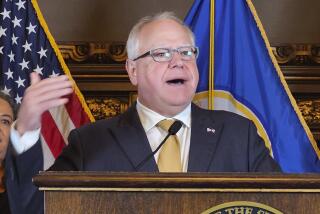Yes, VP Choice Is the President’s : But widespread unease exists about Quayle
- Share via
President Bush’s standard response to questions about Dan Quayle’s political future has been to affirm that the vice president would again be on the 1992 Republican ticket with him. When questioned by reporters Monday, Bush again declared his “full support” for the vice president. Yet opinion polls consistently show that the public does not hold Quayle in high regard; one recent survey found that only 19% believed he would make a suitable President. In ordinary times this probably wouldn’t matter much. Voters tend to vote for the top of the ticket, and Quayle’s lack of popularity in 1988 didn’t prevent Bush from sweeping to victory. But suddenly, these are not ordinary times.
Bush’s weekend bout of atrial fibrillation was another of those scary reminders that presidents, like anyone else, can become ill or even incapacitated, and that vice presidents are in truth only a heartbeat away from the succession. Cardiologists offer encouraging assurances that Bush’s problem can be readily controlled and that he needn’t diminish his activities, a prognosis all Americans welcome. But Americans are also once again obliged to look unblinkingly at the harsh record of modern presidential illnesses, deaths and disabilities.
Of this century’s 17 presidents four have died in office--two by assassination and two by natural causes--one was compelled to resign and five, before Bush, had serious illnesses or required major surgery while in office. One--Woodrow Wilson--was incapacitated for the last 18 months of his presidency, at a time when no constitutional machinery existed for formally transferring the powers of the office.
All candidates for President, of course, aver that their choice for vice president is fully suited to step into the top job; to suggest anything less would demean both candidates. The reality, though, is that most vice presidential candidates have been picked not so much for their administrative or intellectual talents but for the political heft they might bring to a ticket. More often than not candidates are tapped in quest of support from a particular state or region, or to give ideological balance to a ticket. Quayle, largely unknown in 1988 outside of Indiana, is believed to have been anointed by Bush largely to please Republican conservatives who suspected Bush of being excessively moderate. Rather than a political aberration, this method of choosing was comfortably traditional.
Unless his health deteriorates Bush will almost certainly be the GOP candidate in 1992, and his running mate will be his to name. Quayle, politically a good soldier, has built up strong support among many party regulars. It remains a fact, though, that the mass of voters are uneasy at the thought of a Quayle presidency, and Bush’s illness has been a reminder that such a prospect can’t be disregarded. The Constitution imposes no rules for selecting a vice presidential candidate; the responsibility is strictly the parties’. For the Republican Party’s presidential candidate, and its convention, that responsibility could be especially fateful in the summer of 1992.
More to Read
Get the L.A. Times Politics newsletter
Deeply reported insights into legislation, politics and policy from Sacramento, Washington and beyond. In your inbox twice per week.
You may occasionally receive promotional content from the Los Angeles Times.








